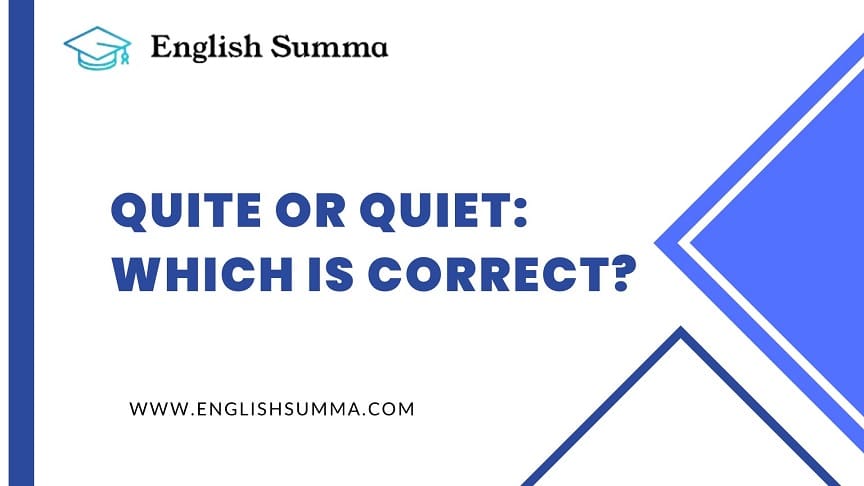The words “quite” and “quiet” look similar, but have very different meanings. This often leads to confusion over which spelling is correct in a given context. In this article, we’ll explore the difference between these two commonly mixed-up words.
Quite vs. Quiet: Definition and Meaning
“Quite” is an adverb that means “to a considerable extent” or “really.” For example:
- Mary was quite tired after the long hike.
- I was quite surprised by the ending of the movie.
“Quiet”, on the other hand, is most often used as an adjective meaning “making little or no noise.” For example:
- The library is a quiet place to study.
- Jim has a quiet, reserved personality.
“Quiet” can also be used as a verb meaning “to make less loud, intense, or violent.” For example:
- The teacher quieted the rowdy students.
- Medication helps quiet my anxiety.
So while “quite” modifies verbs to emphasize their extent, “quiet” describes things that don’t make much noise.
Is it Atleast or At Least? Learn here.
Quite a vs. Quiet and
A common mistake is using “quiet” when “quite a” is called for.
“Quite a” is an idiomatic phrase meaning “remarkable” or “noteworthy.” For example:
- Winning the lottery was quite a surprise.
- She made quite a name for herself as an artist.
“Quiet and” simply joins the adjectives “quiet” and whatever comes after “and.” For example:
- My cat is very quiet and gentle.
- I prefer quiet and intimate dinner parties.
So if you want to describe something as unusual or impressive, use “quite a.” If you just want to say something is quiet in addition to another characteristic, use “quiet and.”
Examples in Literature
To see proper usage of these easily confused words, let’s look at some literary examples:
It was quite a sight, that cat crouching on the rail. – Ernest Hemingway, Cat in the Rain
Hemingway uses “quite a” idiomatically here to mean the cat made for an unusual, remarkable sight on the rail.
He had a quiet and gentle manner that you couldn’t help but like. – Harper Lee, To Kill a Mockingbird
Here Harper Lee correctly uses “quiet and” to list two separate qualities: Atticus Finch’s quiet personality as well as his gentle temperament.
Learn what is correct Wheelbarrow or Wheelbarrel
Synonyms and Related Words
“Quite” has synonyms like rather, fairly, and completely. Words in the same family include quieten, quietude, quiescence, acquiesce.
“Quiet” can be replaced with words like peaceful, silent, soft-spoken, shy, introverted. Related words are quietness, quieten, quietude.
Exploring how these words relate reveals more nuance in their meanings.
Quick Check: Which is Correct?
Still unsure when to use “quite” vs “quiet”? Here’s a quick check:
- The kids were quite noisy during the movie. (Quite = really, to a high degree)
- I prefer a quiet cafe to study in. (Quiet = making little noise)
- Seeing Mount Rushmore was quite a moving experience. (Quite a = remarkable)
- My brother is quiet and studious. (Quiet and = linking quiet with another adjective)
Conclusion
The key difference between “quite” and “quiet“ comes down to their part of speech and meaning. “Quite” emphasizes the extent of an action as an adverb. “Quiet” describes things making little noise, or the action of making something less loud.
Keeping their definitions and a few handy examples in mind goes a long way in choosing the correct word. Misusing these two words is quite a common mistake, but hopefully this breakdown makes their usage crystal quiet!

